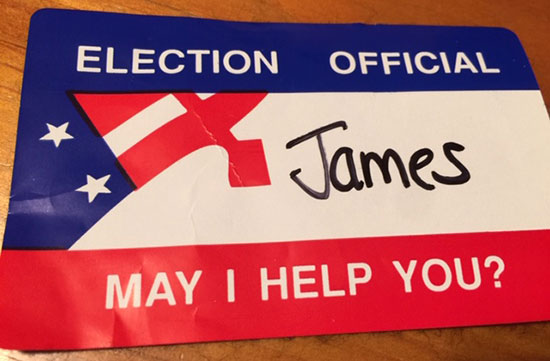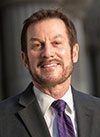
It is unlikely that when Harvard-educated lawyer John Loud invented the ballpoint pen in 1888 – and Hungarian-Argentine journalist Laszlo Biró refined and commercialized it 50 years later – they anticipated the importance of this simple tool to the integrity of a Wisconsin election in the early part of the 21st century.
It is fair to report, however, that, along with a lot of governmental planning, coordination, and oversight – all to ensure accessible, open, healthy, and safe polling in the most recent state elections – the modern version of the stylus was an especially critical feature. At each of the election sites where I worked, every voter was given a new pen to sign the registration record and, just as important, to complete a ballot privately, thoughtfully, and, yes, hygienically.
That tool made it possible for the recently naturalized woman – who proudly announced that she was voting for the first time in her life – to follow the instructions and fill out the ballot my partner and I gave to her. She beamed with delight in fulfilling her civic responsibility.
 James L. Santelle, Univ. of Chicago 1983, a lifelong voter, first served as a poll worker in April 2020. He was employed for 30 years by the U.S. Department of Justice.
James L. Santelle, Univ. of Chicago 1983, a lifelong voter, first served as a poll worker in April 2020. He was employed for 30 years by the U.S. Department of Justice.
The new pen eased the anxiety of the octogenarian couple to complete their task with confidence. They were unmistakably anxious, if not downright fearful, about venturing out of the safety of their home and into a public, populated (but socially distanced) venue for the first time since “stay-at-home” directives and recommendations were announced.
That simple pen represented support for the 18 year old’s decision to enter the gymnasium of the high school he attends (and from which he would be graduating) and timidly but patiently wait in line to register – proper identification securely in hand – before casting a ballot, also for his first time.
That support even facilitated the access to our polling table by the young resident who approached the table in her wheelchair. With a sparkle in her eyes and enthusiasm in her voice, she answered the voter-qualification questions that my partner and I asked and seized with an equal dose of spirit on the signature task that we explained.
That support also allowed the college student returning home “just to vote,” as she explained, to address with my partner and me a registration discrepancy caused by her change in official residence. Then, after only a short delay to clarify the record, she was able to sign in and receive the ballot she deserved.
It even empowered the woman who rolled her eyes dramatically, stepped back to “take in” the image of my partner and me (gloved, masked, and face-shielded, as we were), and express her “disbelief” that election supervisors were reacting to a “nonexistent virus.” In the midst of that, she was able to complete her voting uneventfully.
The ballpoint pen, created hundreds of years ago, symbolically and practically gave those many voters the assurance to exercise their constitutional right to vote with knowledge that their personal well-being would not be compromised. Voting is precisely what we need citizens to do to safeguard and fortify our republic.
And they all got to keep the pen.
» Cite this article: 94 Wis. Law. 47 (April 2021).
Sign Up!
Stay engaged. Learn about the State Bar’s Government Relations program, read the monthly e-newsletter, Rotunda Report, and volunteer to become a poll worker.
State Bar Advocacy Network: wisbar.org/govrelations
Rotunda Report: wisbar.org/rotundareport
Meet Our Contributors
What recent news event prompted you to reflect on a past experience?
 Among the most profoundly moving, if often dangerous, experiences of my two-year tenure in Iraq was the opportunity to visit sites of ancient history – not only the locations where civilization likely began but also the seminal birthplaces of three of the world’s great religions.
Among the most profoundly moving, if often dangerous, experiences of my two-year tenure in Iraq was the opportunity to visit sites of ancient history – not only the locations where civilization likely began but also the seminal birthplaces of three of the world’s great religions.
The recent history-making visit of Pope Francis to Mesopotamia – in and about what The New York Times called “settings both intimate and theatrical, … [making] gestures both concrete and symbolic” – caused me to unearth old maps of places like Najaf and Nasiriyah in the south, Erbil and Mosul in the north.
The Pope’s diplomatic engagements in urban Baghdad (a place of government, commerce, education, and culture) and spiritual ceremonies in rural Ur (from where Abraham began his patriarchal life) prompted me to ponder again the future of this “Land of Two Rivers.”
Iraqis will again return there in six months to elect the 321 members of their Council of Representatives, from which their democratic government – soon approaching its 16th anniversary – will be renewed.
In words that resonate, Pope Francis opined, “This blessed place brings us back to our origins. We seem to have returned home.”
James L. Santelle, Brookfield.
Become a contributor! Are you working on an interesting case? Have a practice tip to share? There are several ways to contribute to Wisconsin Lawyer. To discuss a topic idea, contact Managing Editor Karlé Lester at (800) 444-9404, ext. 6127, or email klester@wisbar.org. Check out our writing and submission guidelines.
